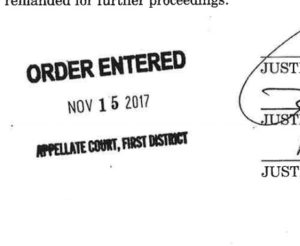Amicus Joined by Chicago Council of Lawyers is Successful
In August, our partner organization—the Chicago Council of Lawyers—joined an amicus brief authored by LAF in a wrongful death suit against the City of Chicago, involving a question about the Illinois Domestic Violence Act.
 In the trial court, the City of Chicago won a motion to dismiss a family’s wrongful death claim against the city police, under the IDVA. On the family’s appeal, the City of Chicago filed a Motion for Reversal with the appellate court citing to the amicus brief, and noting the wide range of agencies that signed onto the brief. After citing to the brief, the city states, “Upon reflection, the City declines to defend the dismissal of Count I . . . .” On Friday, the appellate court granted the motion, allowing the family to move forward with its case.
In the trial court, the City of Chicago won a motion to dismiss a family’s wrongful death claim against the city police, under the IDVA. On the family’s appeal, the City of Chicago filed a Motion for Reversal with the appellate court citing to the amicus brief, and noting the wide range of agencies that signed onto the brief. After citing to the brief, the city states, “Upon reflection, the City declines to defend the dismissal of Count I . . . .” On Friday, the appellate court granted the motion, allowing the family to move forward with its case.
In the case, the family of Vanessa Taylor argued that city police officers failed to take any of the mandatory steps set out in the Illinois Domestic Violence Act to protect victims during a 911 call, placed because Vanessa’s live-in boyfriend was behaving erratically, brandishing weapons and attempting to improvise explosives. Although police successfully subdued the boyfriend and took him to the hospital, he was released after an examination. The day following the incident, police again responded to the home and discovered Vanessa had been murdered by her abuser.
The family argued that the city police officers failed in their duty under the Illinois Domestic Violence Act which includes a mandatory provision for police to provide assistance whenever a law enforcement officer has reason to believe that a person has been abused. The provision further requires them to take an active role in protecting and empowering victims with resources, information and other avenues to safety. Police responding to the 911 call did not offer inform Vanessa of her rights nor of the avenues available for her protection in the situation.
The City moved to dismiss the complaint, arguing that neither Vanessa nor her adult children who had called 911 identified “domestic violence” as a reason for the call, and that, therefore, the provisions did not apply. The trial court agreed and dismissed the case. The family appealed which was when LAF got involved and asked for support from the court reform community.
Because the Chicago Council of Lawyers is a leader in the movement to reform the Chicago Police Department to better serve the needs of the community, including victims of domestic violence, they joined the brief as an amicus. The city’s only public interest bar association, the CCL is dedicated to improving the quality of justice in the legal system by advocating for fair and efficient administration of justice. The Chicago Council of Lawyers works as a collaboration partner with the Chicago Appleseed Fund for Justice to improve the process for unrepresented litigants in the domestic relations and domestic violence divisions of the Cook County courts.
 LAF wrote a compelling argument on the purpose and history of the Illinois Domestic Violence Act with a specific focus on the social nature of the crime and the responsibility of the broader community to protect and assist victims as embodied in its provisions. On behalf of the amici, LAF argued that it was error to construe a provision for mandatory police assistance so narrowly that it required a person to assert that she is explicitly a victim of domestic violence in view of the statute’s purpose of recognizing both a widespread failure to appropriately protect and assist domestic violence victims and a failure of the legal system to effectively deal with family violence. When it passed the relevant sections of the Illinois Domestic Violence Act, the general assembly recognized a police history of failing to take domestic violence calls seriously or consider them a public safety matter.
LAF wrote a compelling argument on the purpose and history of the Illinois Domestic Violence Act with a specific focus on the social nature of the crime and the responsibility of the broader community to protect and assist victims as embodied in its provisions. On behalf of the amici, LAF argued that it was error to construe a provision for mandatory police assistance so narrowly that it required a person to assert that she is explicitly a victim of domestic violence in view of the statute’s purpose of recognizing both a widespread failure to appropriately protect and assist domestic violence victims and a failure of the legal system to effectively deal with family violence. When it passed the relevant sections of the Illinois Domestic Violence Act, the general assembly recognized a police history of failing to take domestic violence calls seriously or consider them a public safety matter.
The history of domestic violence and the legal response to it demonstrates clearly that persons in fear of domestic violence cannot always express that fear. Requiring 911 callers to use the magic words “domestic violence” in order for police to follow the Illinois Domestic Violence Act violates the mandatory language of the statute and is an unreasonable expectation to place on such victims. In the end, the City agreed there may be need to look at the case again in the trial court .
